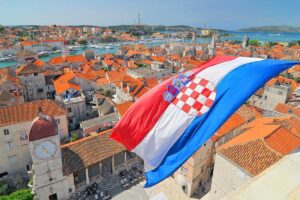
Croatia is a popular country for investing in real estate on the Adriatic coast. However, before buying an apartment or a house, you should consider not only the cost of the property itself, but also purchase taxes, registration fees, and annual maintenance.
Real estate purchase tax
Rate: 3% of the appraised value determined by the local tax authority.
Who pays: the buyer.
When it is paid: within 30 days after receiving the tax notice.
If the purchase is made from a construction company (new construction with VAT), the tax is not paid, and instead, the price includes 25% VAT.
Example: Buying a second-hand apartment for €200,000 → tax = €6,000.
Registration costs
Notary: €200-800 depending on the complexity of the transaction.
Lawyer (optional): 0.5-1.5 % of the property value.
Registration in the land cadastre (Ured za katastar): €40-60.
Translation of documents (if non-resident): €50-150.
Annual real estate tax (from 2025)
Starting from January 1, 2025, a new tax on residential real estate is in force in Croatia, replacing the “resort tax”.
Who has to pay?
Owners of second properties, vacant housing, or properties that are rented out for short-term (less than 10 months).
Does not apply to housing that:
is the primary place of residence;
is rented out for a long-term lease (10+ months per year);
is used for agricultural purposes, or is recognized as unfit for human habitation.
The rate is determined by the municipality:
from €0.60 to €8/m² per year.
In the absence of a decision, the minimum rate of €0.60/m² is automatically applied.
Example: 70 m² apartment in Split → €2/m² → €140/year
Utility costs
Utility fee (kommunalna naknada):
~ €0.3-0.6/m²/month;
Depends on the city, district, type of facility.
Garbage collection fee:
€10-25/month.
Water + sewerage:
€1,5-2,5/м³.
Electricity:
The average bill for an apartment is €40-60/month (in the off-season).
Internet, TV:
€25-35/month.
Tax on rental income
If the property is rented out:
Fixed tax + tourist tax (~€300-500/year).
Additionally: annual registration of the property as a tourist facility (categorization).
It may be necessary to register as an individual entrepreneur (mandatory for incomes above €40,000/year).
Capital gains tax (on sale)
If you sell the property less than 2 years after purchase → 10% tax on the profit.
After 2 years – tax exemption (provided that it is not a commercial activity).
Real estate in Croatia remains attractive to investors and buyers from the EU, Ukraine and other countries. But since 2025, maintenance has become more expensive due to a new annual tax. When buying, it is worth considering both the initial costs (up to 4-5% in addition to the price) and the annual costs (from €500+ depending on the area and use).
Source: http://relocation.com.ua/podatki-na-neruhomist-u-horvatiyi-u-2025-rotsi-analiz-vid-relocation/
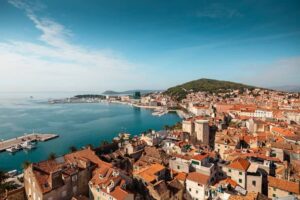
The mortgage market in Croatia is showing stable activity thanks to government programs, favorable conditions offered by banks, and steady demand from both citizens and foreigners.
Since 2017, the SSK (Subvencioniranje stambenih kredita) mortgage subsidy has been in effect, whereby the state compensates up to 50% of the monthly annuity for the first five years on loans of up to €100,000 issued to first-time residents. Pilot assessments show that these measures have led to an increase in housing prices, especially in large cities.
Terms and conditions of mortgage programs at banks
HPB (Hrvatska poštanska banka):
Fixed rate from 2.89%, APR (effective) — 3.00%, term up to 30 years. No property appraisal costs.
OTP banka:
Rate 4.69%, APR 4.93%, term up to 20 years, amount up to €200,000.
Agram Banka:
For new customers, the APR is 5.49% for a 20-year loan (example — €50,000).
Podravska banka:
Fixed rate of 5.90%, APR — 6.15%, no issuance fee.
Conditions for foreigners
Citizens of the EU, Switzerland, Iceland, Norway, and Liechtenstein can obtain a mortgage on the same terms as Croatians. For non-residents, LTV is 50–70%, with state control over the project; a residence permit or long-term stay may be required.
History of rates: from 2017 to 2025
2017–2019: rates were fixed below 3%, especially in HPB, thanks to subsidies and other benefits.
2020–2022: rates rose gradually in line with Eurobonds and monetary easing, reaching 4–5%.
2023–2025: current rates are fixed at 2.9–5.9%, ECA — 3–6%, reflecting tight credit conditions.
The Croatian mortgage market combines state support (SSK), a wide range of offers from banks, and accessibility for foreign buyers, especially from the EU. As a result, potential borrowers can expect rates ranging from 2.9% to 6%, fixed for the entire term of the loan, which is 20 to 30 years.
Source: http://relocation.com.ua/mortgages-in-croatia-overview-of-conditions-and-trends/

In the first four months of 2025, Croatia’s construction sector showed moderate growth amid a slowdown in overall economic growth and changes in legislation. Despite the existing challenges, investments in infrastructure and renewable energy sources are supporting the positive dynamics of the industry.
Key indicators for January–April 2025
Growth in construction output: In February 2025, the volume of construction work increased by 8.7% compared to the same period last year.
New construction orders: In the first half of 2024, the value of new construction orders rose by 14.9% year-on-year, laying the foundation for activity in early 2025.
Gross value added: According to data from December 2024, gross value added in construction reached a record €1,450.5 million. Factors influencing the market
Infrastructure investment: Support from the European Investment Bank, including a €400 million loan, is helping to develop transport and energy infrastructure.
Development of renewable energy sources: The construction of solar and geothermal power plants, such as the 150 MW SE Promina project, is stimulating demand for construction services.
Legislative changes: The introduction of new property taxes and restrictions on short-term rentals create uncertainty for investors and may hold back growth in some market segments.
Forecast for the end of 2025
Expected growth: Croatia’s construction industry is projected to grow by an average of 2.4% in real terms in 2025, with growth supported by investments in infrastructure and energy.
Risks and challenges: A slowdown in economic growth, particularly in Germany, could negatively affect Croatian tourism and, consequently, the construction sector. Thus, despite the existing challenges, the Croatian construction market is showing resilience in 2025, supported by public and private investment in key infrastructure projects.
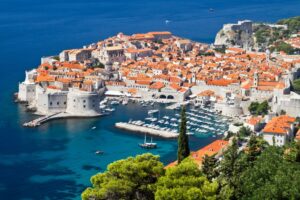
Experts Club has published a study on the dynamics of industrial production in Croatia and its trends in recent years. In the beginning of 2025, industrial production in Croatia shows moderate growth, despite fluctuations in previous months. According to the Croatian Bureau of Statistics, industrial production increased by 5.4% in February 2025 compared to the same period of the previous year. This is a slowdown compared to January 2025, when growth was 7.6%.
The following industries recorded the highest growth in February 2025.
At the same time, consumer goods production declined:
Monthly trends
Compared to January 2025, industrial production fell 3.9% in February. This is the first decline in the last three months, indicating instability in the industrial sector.
Historical dynamics of industrial production (2000-2024)
Below are the dynamics of industrial production in Croatia for the period from 2000 to 2024:
These data reflect fluctuations in Croatia’s industrial production over the last 25 years, with periods of both growth and decline.
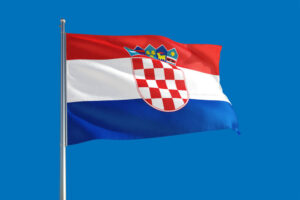
Croatia has a multi-level taxation system that covers both legal entities and individual entrepreneurs (IEs). Let us consider the main taxes applicable to these categories of taxpayers.
Main taxes for legal entities in Croatia:
There are separate taxes for individual entrepreneurs.
Other taxes and fees
The Croatian tax system is characterized by progressive and diverse taxes, which requires careful planning and accounting when doing business.It is recommended to consult with professional tax advisors to ensure compliance with current legal requirements and optimize the tax burden.
Source: http://relocation.com.ua/osoblyvosti-systemy-opodatkuvannia-v-khorvatii/
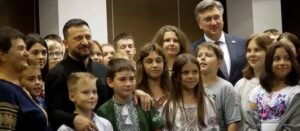
In Dubrovnik, Ukrainian President Volodymyr Zelensky and Croatian Prime Minister Andrei Plenkovic met with Ukrainian children recuperating in Croatia, the press service of the head of state reported.
“Very pleased to be here today. Thanked the Prime Minister’s team for supporting our Ukrainian children, whose parents are heroes of our state, because they defend Ukraine. And there are, unfortunately, those who will remain in our hearts, in history, because they gave the most precious thing – life. We are very grateful to them. And none of us will never forget them,” – said Zelensky.
Currently, 90 Ukrainians are on vacation in the city of Split. All of them are children of soldiers of Kyiv region. Recuperation lasts 10 days and takes place within the framework of the program of the Embassy of Ukraine in Croatia for children of military men. The recreation is financed by the fund of the Honorary Consul of Ukraine in Croatia Ivica Piric. In total, more than 800 children have been able to undergo such recuperation since the beginning of the year.
“I am very glad that Croatia helps our Ukrainian children. Such assistance is very important. Such recreation allows us to support our children so that they smile. I can see it,” Zelensky noted.
Plenkovic added that the Ukrainian president’s visit to Croatia is related to the third summit “Ukraine – Southeast Europe”.
“We are here today to support Ukraine, your people and your president in the fight for your territorial integrity. We very much appreciate the heroism of your parents, with which they have been defending your state for two and a half years,” the Croatian Prime Minister said.
Zelenski and Plenkovic gave the children presents, and the children gave them flags with their signatures.